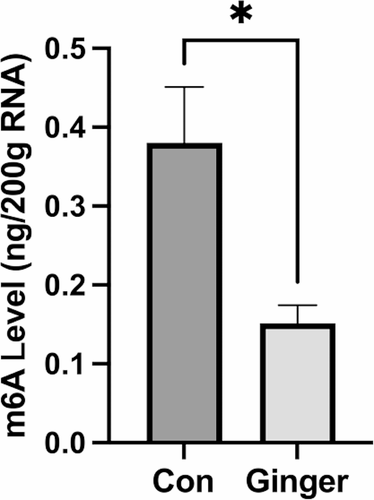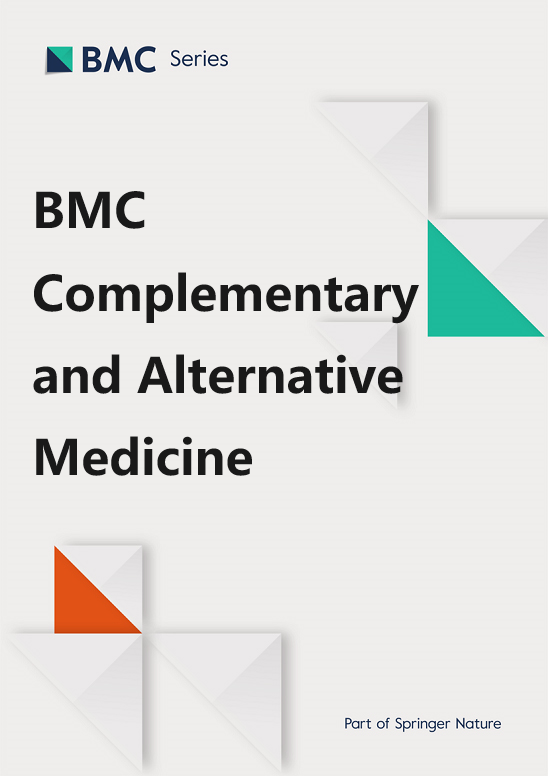Ginger inhibits the invasion of ovarian cancer cells SKOV3 through CLDN7, CLDN11 and CD274 m6A methylation modifications
IF 3.4
2区 医学
Q1 Medicine
引用次数: 0
Abstract
Ginger is a common aromatic vegetable with a wide range of functional ingredients and considerable medicinal and nutritional properties. Numerous studies have shown that ginger and its active ingredients have suppressive effects on manifold tumours, including ovarian cancer (OC). However, the molecular mechanism by which ginger inhibits OC is not clear. The aim of this study was to investigate the function and mechanism of ginger in OC. The estimation of n6-methyladenosine (m6A) levels was performed using the m6A RNA Methylation Quantification Kit, and RT-qPCR was used to determine the expression of m6A-related genes and proteins. The m6A methylationome was detected by MeRIP-seq, following analysis of the data. Differential methylation of genes was assessed utilizing RT-qPCR and Western Blotting. The effect of ginger on SKOV3 invasion in ovarian cancer cells was investigated using the wound healing assay and transwell assays. Ginger significantly reduced the m6A level of OC cells SKOV3. The 3’UTR region is the major site of modification for m6A methylation, and its key molecular activities include Cell Adhesion Molecules, according to meRIP-seq results. Moreover, it was observed that Ginger aids significantly in downregulating the CLDN7, CLDN11 mRNA, and protein expression. The results of wound healing assay and transwell assay showed that ginger significantly inhibited the invasion of OC cells SKOV3. Ginger inhibits ovarian cancer cells’ SKOV3 invasion by regulating m6A methylation through CLDN7, CLDN11, and CD274.

生姜通过 CLDN7、CLDN11 和 CD274 m6A 甲基化修饰抑制卵巢癌细胞 SKOV3 的侵袭
生姜是一种常见的芳香蔬菜,具有广泛的功能成分和可观的药用和营养特性。大量研究表明,生姜及其活性成分对包括卵巢癌(OC)在内的多种肿瘤具有抑制作用。然而,生姜抑制卵巢癌的分子机制尚不清楚。本研究旨在探讨生姜在卵巢癌中的作用和机制。使用 m6A RNA 甲基化定量试剂盒估算 n6-甲基腺苷(m6A)水平,并使用 RT-qPCR 测定 m6A 相关基因和蛋白质的表达。在对数据进行分析后,通过 MeRIP-seq 检测了 m6A 甲基化组。利用 RT-qPCR 和 Western 印迹技术评估了基因的甲基化差异。利用伤口愈合试验和透孔试验研究了生姜对卵巢癌细胞 SKOV3 侵袭的影响。生姜能明显降低卵巢癌细胞 SKOV3 的 m6A 水平。根据 meRIP-seq 结果,3'UTR 区域是 m6A 甲基化的主要修饰位点,其关键分子活性包括细胞粘附分子。此外,研究还发现生姜能显著下调 CLDN7、CLDN11 mRNA 和蛋白质的表达。伤口愈合试验和透孔试验结果表明,生姜能显著抑制卵巢癌细胞 SKOV3 的侵袭。生姜通过CLDN7、CLDN11和CD274调节m6A甲基化,从而抑制卵巢癌细胞SKOV3的侵袭。
本文章由计算机程序翻译,如有差异,请以英文原文为准。
求助全文
约1分钟内获得全文
求助全文
来源期刊

BMC Complementary and Alternative Medicine
INTEGRATIVE & COMPLEMENTARY MEDICINE-
CiteScore
7.00
自引率
0.00%
发文量
0
审稿时长
3 months
期刊介绍:
BMC Complementary Medicine and Therapies is an open access journal publishing original peer-reviewed research articles on interventions and resources that complement or replace conventional therapies, with a specific emphasis on research that explores the biological mechanisms of action, as well as their efficacy, safety, costs, patterns of use and/or implementation.
 求助内容:
求助内容: 应助结果提醒方式:
应助结果提醒方式:


